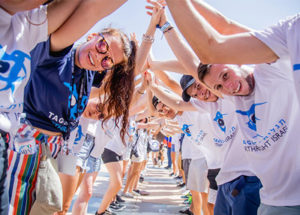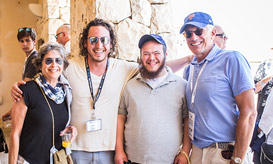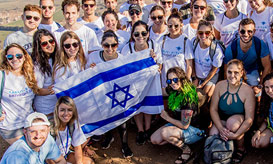Growing up in Massachusetts, my family went to temple every so often. I started going less and…
During my time at Tufts University, I spent months considering whether or not to participate in a Birthright Israel trip. In weighing my decision, I decided that if I were ever to do Birthright I wanted my trip to be through an institution I knew would respect all sides of the geopolitical issue at play. As a recent graduate, the January trip was my last chance to participate through Tufts. I ultimately decided to apply and I attended the Winter Break trip through the campus Hillel in January 2018. Upon reflection, I was thrilled with my decision to take advantage of the opportunity to go to Israel and reflect on my Judaism, and I was very happy with my experience.
This essay is nothing more than a reflection of my own experiences. I do not intend to make any universal claims about every Birthright Israel trip, or the organization as a whole. I haven’t been on any other trip, so I have no experiences with which to criticize or applaud them. All I can speak to is the trip I took part in, which I loved.
My Judaism has always fluctuated. Growing up, my family wasn’t very religious. We went to Temple and said the prayers over Shabbat dinners but I had little interest in continuing my Jewish exploration in college. However, when I arrived at Tufts, I found that my cultural heritage connected me to many other students on campus. I participated in Jewish cultural activities, such as attending Chabad for dinner some nights as well as for High Holidays services. Over time, I became more interested in exploring my Judaism through Birthright, though I was aware of criticisms of the program on campus. In fact, I was critical myself. Talking with Sara Legasey, who organized and led the trip, we discussed my desire to take advantage of the opportunity but also expressed my concern about the program’s perceived one-sidedness. My confidence in the trip increased dramatically after my conversations with Sara. As a Tufts employee who communicates with students on a regular basis, Sara is aware of the political climate and values of the Tufts community and curates her trip accordingly. She shares similar values with me and many of my peers and assured me that the Tufts trip would explore many of the nuances of the Israel-Palestine conflict impartially and honestly.
A major focus of the trips was challenging the traditional practice and faith of Judaism and allowing participants to construct their own interpretations of the religion and its history. For me, coming from the liberal environment of Tufts’ campus, that included questioning Israel’s politics. There was plenty of opportunity and support for me to do exactly that on my trip. Between frequent geopolitical conversations, opportunities to hear the experiences of Israelis my own age and honest information sessions with adults working to create peace in the region, I felt that there was ample space to consider all sides of the story. Sara worked tirelessly to debrief with our group after heated discussions and our tour guide Yossi was open, truthful and genuine about his own experiences.
Yossi, whose father survived the concentration camps during the Holocaust, led a conversation after our visit to the Holocaust museum. He posed to us three possible responses to the atrocities committed: 1) To write the Holocaust off as a one-time event from which we have nothing to learn; 2) To use it as a justification for pure self-preservation of Judaism; or 3) To understand our obligation to stop genocide and similar horrors from happening to any other groups. This third option seemed to me to be at the heart of the way our trip was run.
On our trip, we experienced firsthand accounts of life in a region of conflict, which challenged my biases and beliefs more than I had expected. I had conversations with new friends late at night about the history of antisemitism and more modern injustices, and I later brought those conversations to Sara, our tour guide, the Israelis and other members of the trip in more structured group conversations. One conversation with the director of education for Birthright Israel, Dr. Zohar Raviv, stood out to me. He addressed many of the criticisms of the program, echoing what I had spoken about with Sara, by talking about the “Birthright Agenda.” Any organization, he assured us, has an agenda and he was quite upfront about acknowledging and owning up to that. The Birthright agenda, according to him, is to have us question our Judaism to explore every aspect of it and challenge our beliefs. This includes challenging our relationship with Israel and looking at all sides of the story.
Through Birthright I feel that I was given the opportunity to begin the work of challenging what it means to me to be Jewish. I am grateful for the experience and I admire the tireless work that our leaders, Sara, Abby and Yossi did to support us as we explored both the Israeli and Palestinian narratives. I wholeheartedly recommend the experience to anyone with an open mind and an interest in exploring their Judaism.













